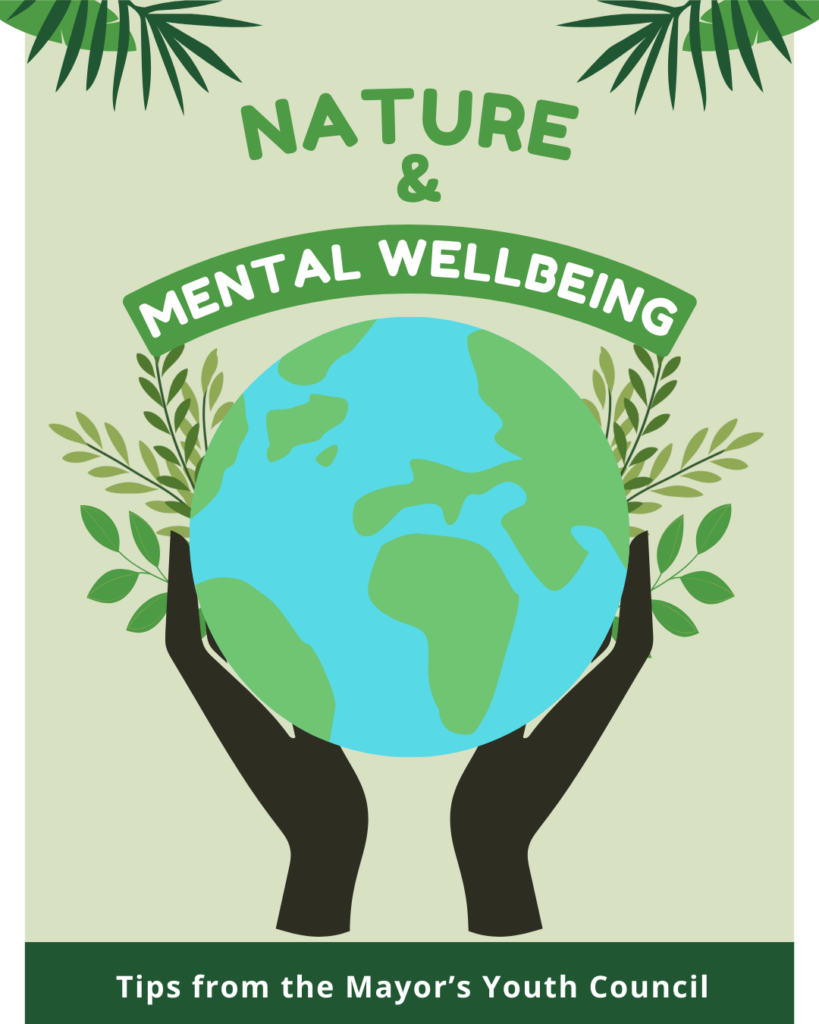Introducing the Mayor’s Youth Council Health and Well-Being Column! Each month, we’ll share fun, relevant, easy-to-follow mental health tips through the Youth Central newsletter, giving you the tools and support to prioritize your well-being with new topics and advice every month!
Every year, you may notice green posts begin to fill up your feed on April 22, the world turns green for just a single day. “save the planet” posts, companies promote themselves as a sustainable brand, and people suddenly remember that recycling exists. But for many young people, Earth Day isn’t just another post in their feeds, it’s their future. Climate change is more than real, and we’re in the middle of it. The planet is heating up, forests are disappearing, and natural disasters are getting worse. But what doesn’t get talked about enough is how all of this affects youth mental health. How does it feel to know that the world you’ll inherit is on fire, literally? This eco-anxiety is something more and more young people are dealing with.
Eco-Anxiety
When youth begin to understand the true detrimental harm of climate change it comes with a sense of dread and fear. It’s not like the stress about a test or anxiety, it’s a crisis youth must deal with. It’s scrolling through news about melting glaciers and realizing that this isn’t some distant problem, it’s happening now.
But here’s the thing: this anxiety doesn’t change the world, it helps us solve the problem, and is a crucial step but it isn’t the final step. Action does. And that’s why Earth Day matters, not just for the environment, but for our own mental well-being.
Why Earth Day Can Actually Make You Feel Better
Feeling alone in your worries makes them heavier and 10x worse. That’s why community is so important. Earth Day events bring people together, whether it’s a local cleanup, protests, or a sustainability fair, you’ll find others who care about the same things you do. There’s power in collective action, and there’s comfort in knowing someone else acknowledges the destruction in our world
Earth Day is a chance to shift the narrative, not just “the world is doomed,” but “we still have a chance.” It’s a day to learn, to take action, to find solutions. And when you start focusing on what can be done instead of just what’s going wrong, something shifts. That’s not just good for the planet, it’s good for your mental health too!
There’s a reason people say “touch grass.” Studies have proven that being in nature helps lower stress and improve mood. But in a world of endless screens and constant bad news, it’s sooo easy to forget that. Earth Day encourages people to step outside, not just to help the planet, but to reconnect with it. Whether it’s through a hike, a gardening project, or even just sitting under a tree for a while, each day we benefit from the vast earth around us.
What Happens After Earth Day?
Here’s the problem, April 22 ends, and the world moves on. The corporations stop pretending to care, and most people go back to their usual routines. But if you really care, if you want to make a lasting impact, both for the environment and for your own well-being, Earth Day has to be more than just a single day.
Instead you could join a local sustainability group like Green Calgary, or Earth Rangers to stay involved with people who are working on solutions year-round. Learn to advocate for change. Write to your city officials, push for policy changes, and hold fast fashion companies accountable for unethical practices. Make nature a part of your daily routine! Spend time outside, not just as an activist, but as someone who genuinely enjoys the world we’re fighting to protect.
Think about it, every civilization, every culture, every tradition started with the same land. The rivers dictated where cities were built. The soil decided what food we ate. The mountains, the plains, the oceans, shaped the way people lived, worked, and even thought.
The land still influences us. Some of our best memories are tied to nature, summer hikes, bonfires on the beach, playing in the snow, or just lying on the grass and staring at the sky. Most likely your favourite memory doesn’t even involve a screen or any technology. Even if we don’t realize it, the land teaches us patience, resilience, and connection.
Earth Day isn’t just about saving the environment, it’s about saving ourselves too. Because the truth is, we need the planet more than it needs us. The planet has been here before us and will be after us.
So this Earth Day :
- We can reconnect. Go outside. Please, we need the land, it doesn’t need us, use it while we have it.
- We can use it wisely. Instead of draining the land dry, we can give back. Grow something. Protect green spaces. Support sustainable practices.
- We can learn from it. The land teaches patience, the way a tree grows slowly but surely. the way flowers bloom even in the harshest conditions. If we paid attention, we’d realize that the lessons we need most are in front of us
The Final Question: What Will We Leave Behind?
One day, we’ll be gone, but the land will remain, or at least, what’s left of it. What kind of Earth are we leaving behind? A thriving, beautiful world that future generations can walk through, explore, and love? Or a wasteland of what could have been?
